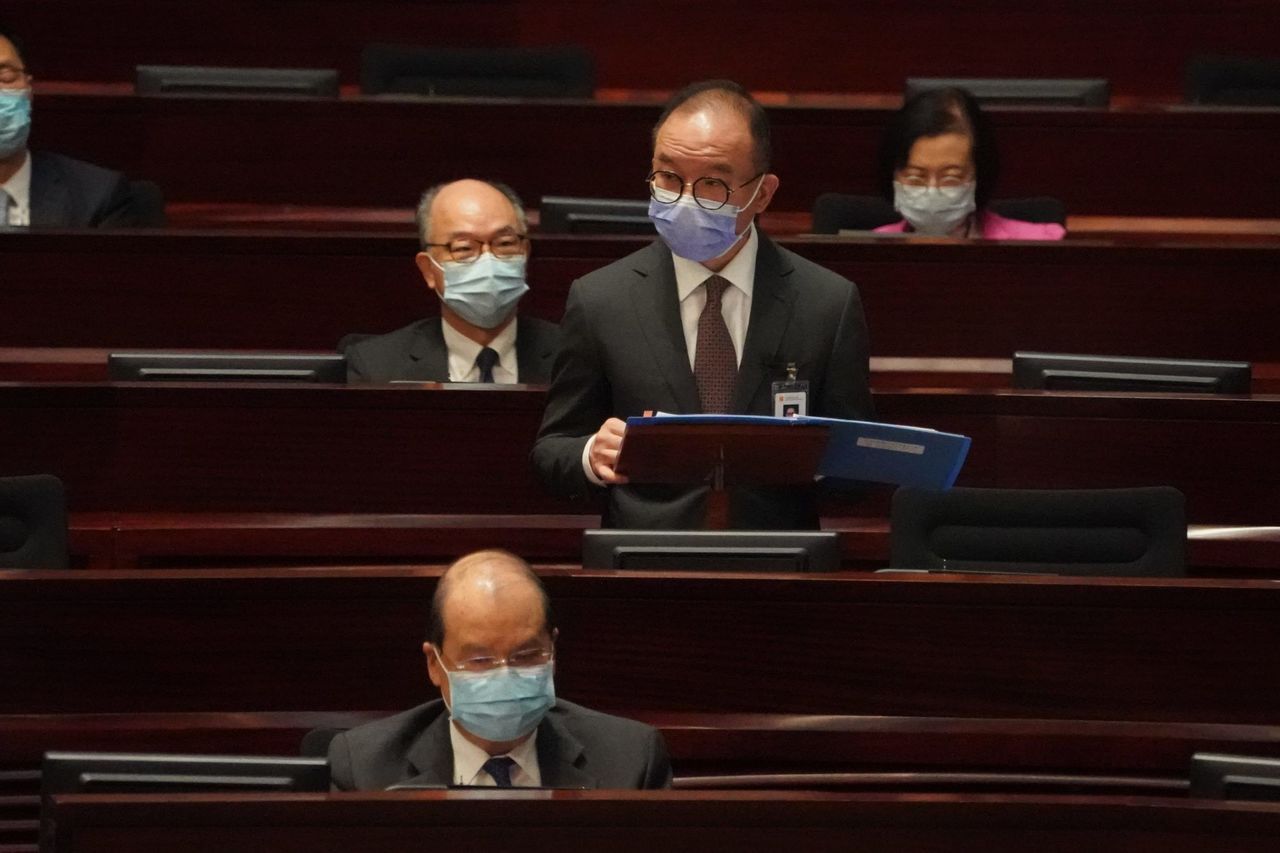Ministers also reveal the term for newly empowered Election Committee to last five years, but say they are in the dark over what happens next.
Hongkongers living in mainland China may be allowed to cast their votes in future local elections at special polling stations on the city side of border if the coronavirus pandemic continues to curb travel.
Officials also told lawmakers the newly empowered Election Committee would run for a five-year term until 2026, but added beyond then its exact fate was unknown because the central government had ordered a “vacuum period” at that point, pending further instructions.
The government on Saturday for the first time put its umbrella bill for delivering Beijing’s drastic overhaul of Hong Kong’s electoral system before the Legislative Council for lawmakers to scrutinise.
Members of the legislative bills committee spent only two hours discussing the overall principles of the bill – which includes more than 700 pages of amendments to existing ordinances and subsidiary legislation – before moving on to study the articles one by one.
The city administration previously said it expected the bill to be approved by the end of next month, with the legislature holding extra meetings.
Fearing another health crisis setback, some pro-establishment lawmakers asked whether the government was prepared to postpone three coming elections. The Election Committee contest is scheduled for September, followed by the Legco polls in December and the chief executive race in March next year.
In response, Secretary for Constitutional and Mainland Affairs Erick Tsang Kwok-wai said the government must consider the infection trends at the relevant time, adding officials were also mulling emergency measures such as allowing Hongkongers residing on the mainland to vote.
“One of the emergency plans include setting up polling stations at the border, so that those who want to vote and are unable to come back due to pandemic restrictions can still vote at the polling stations that we set up at the border,” he said.
Tsang said such a plan could allow elections to proceed even if there was a rebound of Covid-19 cases in Hong Kong, but he stopped short of disclosing how many polling stations there would be and who would be eligible to vote at them.
A government source confirmed the plan involved installing polling stations on the Hong Kong side of the border.
It would only work if mainland authorities allowed voters to enter Shenzhen – the city over the border from Hong Kong – without undergoing quarantine, the insider added.
Setting up polling stations on the mainland side was not in discussion at the moment, according to the source.
Under the draft legislation, the Election Committee – now tasked with not only picking the city’s leader but also nominating lawmakers, and even fielding representatives of its own to the legislature – will conclude its initial five-year term on October 21, 2026.
Pro-establishment lawmakers including Wong Kwok-kin, also a member of the Executive Council, and lawyer Tse Wai-chun, raised concerns over whether there would have to be a “gap period” following the conclusion of that term, with another chief executive election coming in 2027.
Permanent Secretary for Constitutional and Mainland Affairs Roy Tang Yun-kwong said city officials had received instructions from the central government confirming the 1,500 committee members elected in September this year would serve until 2026, but admitted the local administration had no idea what would happen after then.
“We have been communicating with the central government, and the advice we received clearly was to ‘leave a vacuum period’ at this moment, and we must follow,” he said. “We know the central government will make another decision at some point later, and we may not know it that soon.”
 Constitutional and mainland affairs minister Erick Tsang (centre).
Constitutional and mainland affairs minister Erick Tsang (centre).
Some key amendments that raised eyebrows in the local legislation related to the composition of sectors in the Election Committee, which include representatives from various trade groups and professions.
Traditional Beijing-friendly organisations and unionists in Hong Kong with a track record of mobilising pro-establishment supporters in polls emerged as the big winners, yet some lawmakers were dissatisfied that some of their key supporters were removed or not even invited onto the powerful committee.
Sports, performing arts, culture and publication sector lawmaker Ma Fung-kwok said he was not only unhappy that half of the 60 seats were removed from that sector, but also that iconic and historic art groups had been left out.
“Groups such as the Hong Kong Institute for Promotion of Chinese Culture and sports federations in over 22 districts have been devoting themselves to the community for decades, and I would never doubt their roles as ‘patriotic bodies’ and ‘having enough representation’, but they were not involved,” Ma said.
Echoing him, lawmaker and executive councillor Regina Ip Lau Suk-yee said she was also disappointed the amendments had removed some of the senior representatives in the travel sector, such as the Travel Industry Council of Hong Kong. She asked if the government could re-evaluate and promise to amend the sectors list in the future.
Tommy Cheung Yu-yan, her colleague in the Executive Council, also said many representatives from the catering industry had sent him letters asking for an explanation on why they were not included, as he urged the government to look at whether changes were possible.
Tsang said the government overall considered three factors: whether the group was representative, held close connections with the industry and if they were capable of upholding the principle that only patriots governed the city, a key plank of Beijing’s reforms.
“We may not be able to fulfil everyone’s expectations,” he said. “We hope that legislators can deliberate and approve the bill in a pragmatic manner. The process is not completely unchangeable, but I still think we will stick according to those principles.”















